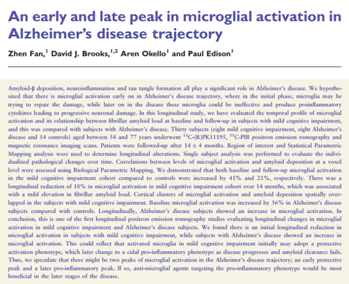An early and late peak in microglial activation in Alzheimer’s disease trajectory
This study looked into the resident immune cells (microglia) in the brain. It is thought that these initially have a protective effect on the neurons and repair damage to them, however, as the disease progresses they become damaging and trigger further inflammation in the brain.
In this study, we evaluated the pattern of the resident immune cells in the brain and in the temporal region of the brain in a group of participants with mild cognitive impairment and patients with Alzheimer’s disease.
We found an initial reduction in activation of these immune cells in patients with mild cognitive impairment. We also found, in Alzheimer’s disease patients, that activation of these immune cells is increased. These findings suggest that medications targeting these cells, thus reducing inflammation, may be beneficial in the latter stages of Alzheimer’s disease.

